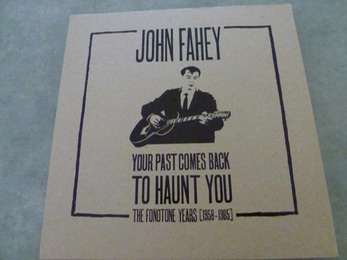
WEdnesday, 2 April 2013
There are times when the digital download just isn’t enough, and this five disk, 115 track box set is one of them. As a certified Fahey fan who’s in the process of acquiring everything in the man’s acoustic back catalogue (I’m not so sure about his later, more confrontational electric explorations, though no doubt I’ll be sampling some of them in the future) the chance to get back to Fahey’s very earliest work seemed like a no-brainer when I spotted these titles in the iTunes store, even at $16.99 a throw. We are, or rather were, looking at the formative years of one of Hughesy’s favourite musos.
With something like this, however, it’s not just the what when it comes to the recording, it’s the where, the when and the why, which explains why I’ve been forced to shell out for a hard copy. The hard copy comes with an accompanying hard cover 88-page book, and if I’d investigated first I wouldn’t have gone down the digital path at all.
Checking the possibilities at Fishpond alerted me to the presence of Vampire Vultures, the sequel to How Bluegrass Music Destroyed My Life (still need to track that one down, but it won’t be long before I do) and with Vampires marked down from $21 to $13.25 and Your Past around half price ($154 into a tad under $76) the catch-up exercise wasn’t as heavy on the hip pocket as it might have been.
Most of the music, at least in this incarnation, is available in a digital format for the first time, remastered from reel-to-reel tapes recorded in a basement in Frederick, Maryland for Joe Bussard’s tiny Fonotone label. That in this incarnation bit is the key here, because much of this material was revisited in later sessions.
Appearing a decade after Fahey’s death, the hard copy comes in a cardboard slip case, with two inserts.
One, a gatefold portfolio lined with period photographs, contains the five disks with 115 tracks sequenced chronologically, apart from a 1967 interview snippet that sets the scene for what follows as Fahey does his best to veer attention away from the rough hewn emulation of Charlie Patton and Mississippi John Hurt as Joe Bussard rolled tape and provided strong drink. The results were manually cut onto 78, 45 or 33 rpm disks from the master tape, each slightly different from other renderings of the same piece of tape.